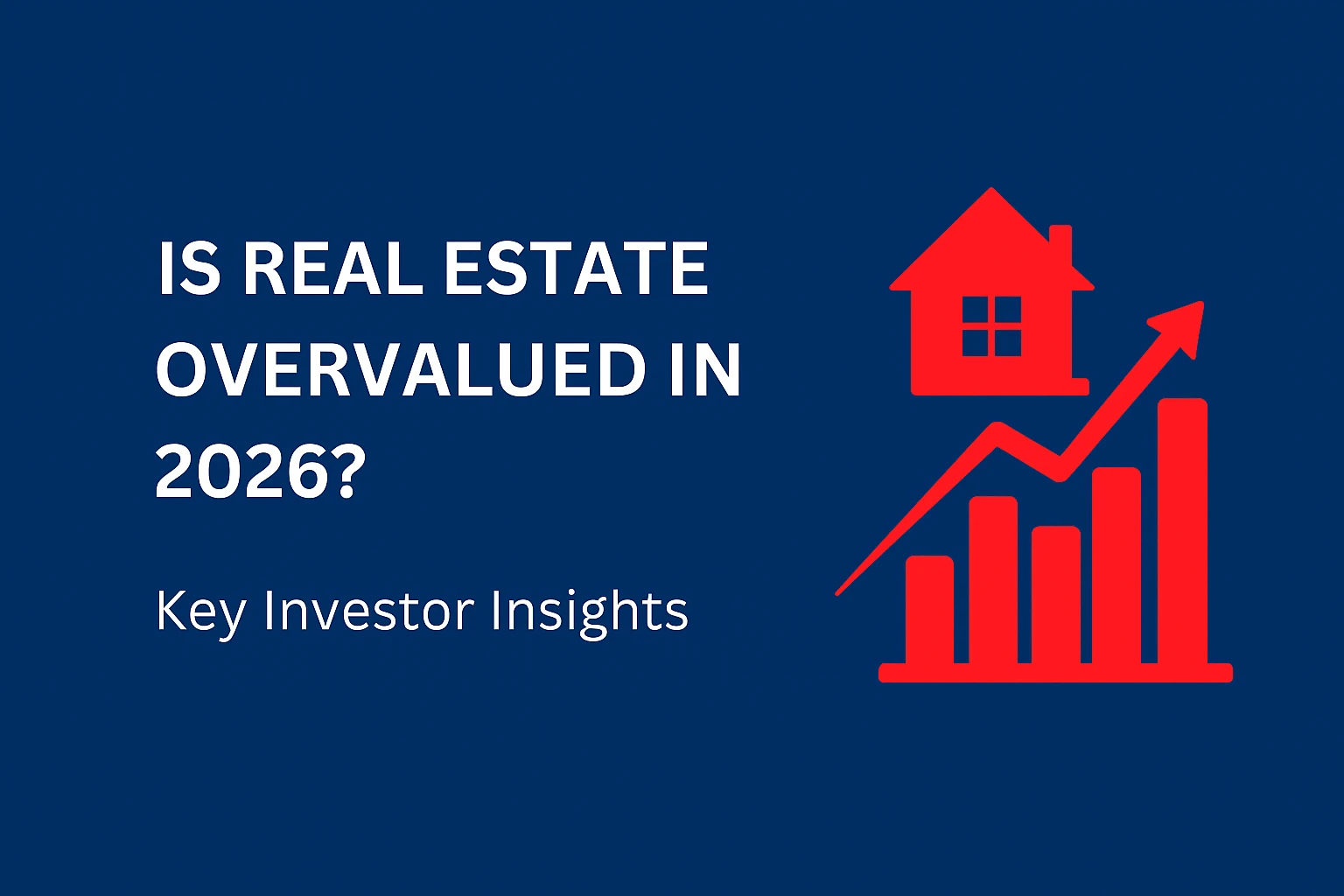As we move into 2026, one pressing question dominates the minds of investors: Is real estate overvalued? Real estate has long been a cornerstone of wealth-building, offering tangible assets, potential rental income, and a hedge against inflation. However, with fluctuating global economies, rising interest rates, and shifting demographic trends, the Housing Market is experiencing significant volatility. Understanding whether property prices are currently overvalued is critical for investors, homebuyers, and developers seeking to make informed decisions.
Real estate’s appeal stems from its stability and potential for long-term appreciation, but 2026 presents unique challenges. Are current property prices justified by fundamentals, or are speculative bubbles inflating values beyond sustainable levels? This article explores the valuation of property in 2026, the risks and rewards of investing, and the key factors shaping the market. By the end, you’ll gain actionable insights to decide whether to buy, hold, or sell real estate in today’s dynamic environment. For related insights, explore our guide on Digital vs Physical Gold: Best Investment for 2026?.

Table of Contents
- Understanding Real Estate Valuation
- Key Factors Suggesting Real Estate May Be Overvalued
- Factors Supporting Real Estate Investment
- Risks of Investing in Real Estate in 2026
- Rewards of Investing in Real Estate
- How to Analyze Whether Real Estate Is Overvalued
- Investment Strategies for Real Estate in 2026
- Real Estate Market Outlook 2026
- Frequently Asked Questions (FAQ)
- Conclusion
Understanding Real Estate Valuation
What Determines Real Estate Prices?
Property prices are driven by a complex interplay of factors, including:
- Economic Conditions: Inflation, employment rates, and GDP growth influence purchasing power and demand for properties.
- Interest Rates: Higher mortgage rates increase borrowing costs, potentially cooling demand and pressuring prices.
- Supply and Demand: Limited housing supply in desirable areas drives prices up, while oversupply can lead to corrections.
- Demographic Trends: Population growth, urbanization, and generational shifts (e.g., millennials entering the housing market) shape demand.
- Government Policies: Tax incentives, zoning regulations, and infrastructure investments impact market dynamics.
To determine if real estate is overvalued in 2026, investors must analyze these factors alongside local market trends. Supply constraints, such as delays in construction due to labor shortages or rising material costs, and demand surges, like those driven by remote work trends, add further complexity.
Historical Perspective on Housing Market Prices
Over the past two decades, real estate has seen cycles of booms and busts. The 2008 housing crisis, triggered by subprime lending, led to a global market crash, with U.S. home prices dropping 30% on average. Conversely, the post-COVID-19 recovery in 2020-2022 saw prices soar due to low interest rates and high demand for suburban homes. Comparing 2026 prices to inflation-adjusted historical averages helps assess whether current valuations are sustainable. For instance, if median home prices in major cities exceed 10 times median household income, it may signal overvaluation.
Key Factors Suggesting Real Estate May Be Overvalued
Rising Interest Rates
In 2026, central banks, including the U.S. Federal Reserve, are expected to maintain or increase interest rates to combat persistent inflation. Higher rates raise mortgage costs, reducing affordability and potentially cooling demand. For example, a 1% rate hike can increase monthly payments by 10-15% on a 30-year mortgage, pricing out some buyers and pressuring property prices downward.
Speculative Bidding Wars
In hot markets, speculative buying—driven by investors, flippers, or fear of missing out (FOMO)—can inflate prices beyond fundamentals. In 2025, bidding wars in cities like Austin and Miami pushed home prices 20-30% above asking prices in some cases. If these trends continue into 2026, they could indicate a speculative bubble ripe for correction.
Supply Chain and Construction Costs
Persistent supply chain disruptions and rising costs for materials like lumber and steel have constrained new housing supply, artificially inflating prices. If construction activity ramps up in 2026, increased supply could lead to price stabilization or declines, suggesting current valuations may be unsustainable.
Economic Slowdowns
A potential global economic slowdown in 2026, driven by trade tensions or energy crises, could reduce consumer confidence and demand for real estate. If job growth stalls or unemployment rises, fewer buyers may enter the market, leading to downward pressure on prices.
Factors Supporting Real Estate Investment
Inflation Hedge
Real estate often appreciates during inflationary periods, preserving wealth as property values and rents rise with living costs. In 2026, with global inflation projected at 3-5%, real estate remains an attractive hedge for investors.
Rental Income Potential
Properties in high-demand areas generate steady cash flow through rentals. In 2026, urban centers and emerging suburbs are seeing strong rental demand due to hybrid work models, supporting investment returns.
Long-Term Appreciation
Historically, real estate appreciates over time, outpacing inflation. Data from the National Association of Realtors shows U.S. home prices have risen 5% annually on average since 1980, making it a reliable long-term investment.
Demographic and Urbanization Trends
Millennials and Gen Z entering the housing market, combined with urbanization in emerging cities, sustain demand. For example, migration to affordable regions like the U.S. Sun Belt or India’s Tier-2 cities is driving real estate growth in 2026.
Risks of Investing in Real Estate in 2026
- Price Volatility: Markets can experience sharp corrections, especially in overheated regions.
- High Leverage Risks: Borrowing heavily to invest increases exposure to interest rate hikes and market downturns.
- Liquidity Constraints: Real estate is less liquid than stocks or gold, making it harder to sell quickly during crises.
- Maintenance and Taxes: Properties incur ongoing costs like maintenance, property taxes, and insurance, which can erode returns.
Rewards of Investing in Real Estate
- Tangible Asset: Real estate offers physical ownership, providing security and control.
- Diversification: Adding property to a portfolio reduces reliance on volatile stocks or bonds.
- Tax Benefits: Deductions for mortgage interest, depreciation, and property taxes enhance returns in many markets.
- Wealth Creation: Appreciation and rental income build long-term wealth, especially in growing areas.
How to Analyze Whether Real Estate Is Overvalued
Price-to-Income Ratio
Compare median home prices to median household incomes. A ratio above 5:1 often indicates overvaluation, as seen in cities like San Francisco or Toronto in recent years.
Price-to-Rent Ratio
Divide average home prices by annual rental income. Ratios above 20 suggest buying is less affordable than renting, signaling potential overvaluation.
Interest Rate Impact
Monitor central bank policies. In 2026, a sustained rise in rates could reduce affordability, cooling overheated markets.
Inventory Levels
Low housing inventory (e.g., less than 3 months’ supply) drives prices up, but a sudden increase in listings could trigger corrections.
Market Sentiment
Track buyer behavior and investor activity. Excessive flipping or speculative buying, as seen in 2025 data from Zillow, may indicate a bubble.
Investment Strategies for Real Estate in 2026
Long-Term Holding
Buy properties in growing areas for appreciation and rental income. Focus on emerging markets like Raleigh, NC, or Hyderabad, India, with strong economic fundamentals.
House Hacking
Live in one unit of a multi-family property while renting out others to offset mortgage costs, ideal for first-time investors.
REITs and Real Estate ETFs
Real Estate Investment Trusts (REITs) and ETFs offer exposure without direct ownership. They provide liquidity and diversification, suitable for hands-off investors. Learn more in Mutual Funds vs ETFs.
Fix-and-Flip
Purchase undervalued properties, renovate, and sell for profit. This high-risk strategy requires market timing and expertise.
Dollar-Cost Averaging
Invest gradually in REITs or crowdfunding platforms to mitigate price volatility, spreading risk over time.
Real Estate Market Outlook 2026
Experts predict a mixed outlook for 2026. While some markets may face corrections due to high interest rates and oversupply, others will thrive due to demographic shifts and urbanization. Key trends include:
- Urban revival: Cities like New York and Mumbai see renewed demand as workers return to offices.
- Sustainable real estate: Green buildings and eco-friendly developments gain traction, boosting property values.
- Affordable markets: Tier-2 cities and suburban areas attract buyers priced out of metros.
- Rate stabilization: If central banks pause rate hikes, demand could stabilize, supporting prices.
For broader market impacts, see How Global Events Affect Stock Market Volatility.
Frequently Asked Questions (FAQ)
Is real estate a safe investment in 2026?
Yes, but risks like volatility and interest rate hikes require careful analysis. It’s safer in diversified, growing markets.
Should I buy real estate if it’s overvalued?
Proceed cautiously. Focus on undervalued areas or use dollar-cost averaging in REITs to reduce risk.
How does real estate compare to other investments?
Real estate offers stability and income but is less liquid than stocks or gold. Compare with 2026 Gold Boom.
Can real estate prices crash in 2026?
A crash is possible in overheated markets, but diversified portfolios and strong fundamentals mitigate risks.
What’s the ideal portfolio allocation for real estate?
Typically 10-20%, depending on risk tolerance and goals. Consult a financial advisor for personalized advice.
How do I start investing in real estate?
Begin with REITs, crowdfunding, or small rental properties. Research local markets and leverage tax benefits.
Conclusion
The question “Is real estate overvalued in 2026?” lacks a universal answer. While some markets show signs of overvaluation, real estate remains a compelling investment for diversification, income, and long-term growth. Investors must monitor interest rates, supply trends, and local dynamics to make informed decisions. By employing strategies like long-term holding or REIT investments, you can navigate risks and capitalize on opportunities. For alternative investments, explore Investing in US Stocks from India.
Key Takeaways:
- Real estate may be overvalued in some markets, but fundamentals support long-term investment.
- Monitor interest rates, inventory, and buyer sentiment to assess valuation.
- Diversify with REITs, rentals, or house hacking to balance risk and reward.
- Stay informed on global trends via Investopedia’s real estate guide.
- Read more On Real Estate How to Verify Property Documents Before Buying a Home, Future of Real Estate Investment: Global Hotspots to Watch.


